The images show an association of this weapon with Orientals. A connection with warfare on the Iberian peninsula is not clear cut. I suspect that Shakespeare's expression "Moorish javelin" refers to them.
All riders use this weapon overhand, none is seen using possible underhand techniques. The length of some of these items suggests a possible ranged and close combat use.
Does the "Morrish pike" (some kind of half-pike), known from naval warfare inventories, also refer to these?
Is there a difference of length of the same design that turns Moorish pikes into Moorish javelins?
| Kurt Scholz wrote: |
| The images show an association of this weapon with Orientals. A connection with warfare on the Iberian peninsula is not clear cut. I suspect that Shakespeare's expression "Moorish javelin" refers to them.
All riders use this weapon overhand, none is seen using possible underhand techniques. The length of some of these items suggests a possible ranged and close combat use. Does the "Morrish pike" (some kind of half-pike), known from naval warfare inventories, also refer to these? Is there a difference of length of the same design that turns Moorish pikes into Moorish javelins? |
Some do have that ancient/eastern association, but it clearly was a contemporary European weapon as well. It's shown in the ca. 1480 illuminations for Froissart's chronicles of the 100 years war--mainly in naval contexts. It's in the Beauchamp Pageant as well, though also in the naval context. It also is associated with images of Death.
Here's one of the ancient associations, but note that all of the arms are contemporary European and very detailed.
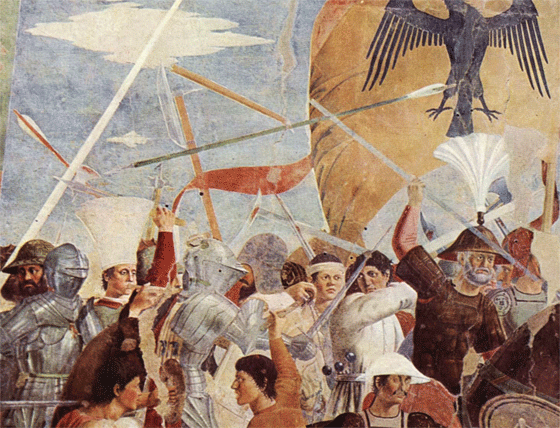
I've been thinking about the ballistic influence of these feathers and possible reasons for the dual use nature. The feathers move the center of pressure further back from the iron head. This stabilizes the flight path.
You can use the shift of the center of pressure to shift the center of mass as well. Either you reduce the weight of iron used in the head or you increase the mass and stability of the wooden staff.
Thank you, I knew the connection with European warfare. It was an early landsknecht weapon that was later dropped for pikes. I can not remember the name, although I see the images in my mind.
You can use the shift of the center of pressure to shift the center of mass as well. Either you reduce the weight of iron used in the head or you increase the mass and stability of the wooden staff.
Thank you, I knew the connection with European warfare. It was an early landsknecht weapon that was later dropped for pikes. I can not remember the name, although I see the images in my mind.
I am feeling I may have to make a one of these as it seems to have caught so many of our imaginations and we need some answers!
Some of these were found on the Mary Rose with wooden fletchings, and I can see them being totally formidable from the tops. The fletchings (speculation here) would also help to correct any deviation caused by hitting any rigging on the way down.
On the battlefield it would also mean that the skill of throwing a spear well and straight would be largely negated and that is always handy if you are being stressed while trying to execute a skill. The payoff is slightly more drag, so a shorter throw.
Peter made a good point in that throwing cord would be the obvious addition here, but they look rather substantial and in my experience cords and atlatls etc work well with lighter projectiles so I suspect they were just a spear deviation.
Tod
Some of these were found on the Mary Rose with wooden fletchings, and I can see them being totally formidable from the tops. The fletchings (speculation here) would also help to correct any deviation caused by hitting any rigging on the way down.
On the battlefield it would also mean that the skill of throwing a spear well and straight would be largely negated and that is always handy if you are being stressed while trying to execute a skill. The payoff is slightly more drag, so a shorter throw.
Peter made a good point in that throwing cord would be the obvious addition here, but they look rather substantial and in my experience cords and atlatls etc work well with lighter projectiles so I suspect they were just a spear deviation.
Tod
I suspect that this kind is the "dardo" so usual in Castille. They were used as light infantry with a big or small pavise, together with crossbowmen.
The Arcila or Pastrana tapestries shows them stored in the Portugese ship's tops and being thrown at the Portugese besiegers.
[ Linked Image ]
http://www.flandesenhispania.org/tapestries/i..._Arcila%29
Also, there should be an image of a ginete using them somewhere I can't find now [sigh!]
The Arcila or Pastrana tapestries shows them stored in the Portugese ship's tops and being thrown at the Portugese besiegers.
[ Linked Image ]
http://www.flandesenhispania.org/tapestries/i..._Arcila%29
Also, there should be an image of a ginete using them somewhere I can't find now [sigh!]
There are references to these in Irish stories I believe, in the Fenian cycle? I believe they talk about darts and javelins somewhat interchangably in the English translations though that doesn't mean much. I'll have to go and look it up. I think there is also a famous painting of an English Lord with some Irish arms which includes a large vaned javelin.
I think we should remember the obvious relation with the (smaller but similar) Roman plumbata, used well into late Imperial times, I think certain legions were equipped with these instead of pilum. They were said to be their longest ranged weapon.
[ Linked Image ]
[ Linked Image ]
http://en.wikipedia.org/wiki/Plumbata
http://www.roman-artifacts.com/military%20acc...umbata.htm
There is also the 'Swiss' Arrow
http://en.wikipedia.org/wiki/Swiss_arrow
http://www.art-wallpaper.com/22923/Strauch+Wo...22923.jpg]
This to me to some extent a link to an at least similar weapon on the European Continent, going way back.
The quesiton is, what is a good generic name for such a weapon, a 'vaned javelin'?
Here is another big one
[ Linked Image ]
J
I think we should remember the obvious relation with the (smaller but similar) Roman plumbata, used well into late Imperial times, I think certain legions were equipped with these instead of pilum. They were said to be their longest ranged weapon.
[ Linked Image ]
[ Linked Image ]
http://en.wikipedia.org/wiki/Plumbata
http://www.roman-artifacts.com/military%20acc...umbata.htm
There is also the 'Swiss' Arrow
http://en.wikipedia.org/wiki/Swiss_arrow
http://www.art-wallpaper.com/22923/Strauch+Wo...22923.jpg]
This to me to some extent a link to an at least similar weapon on the European Continent, going way back.
The quesiton is, what is a good generic name for such a weapon, a 'vaned javelin'?
Here is another big one
[ Linked Image ]
J
Not fletched, and a later Irish type, but probably the most realistic depiction of one of these weapons. ca. 1680.
Note the thong, which was a feature of the Irish version.
 Attachment: 100.22 KB
Attachment: 100.22 KB
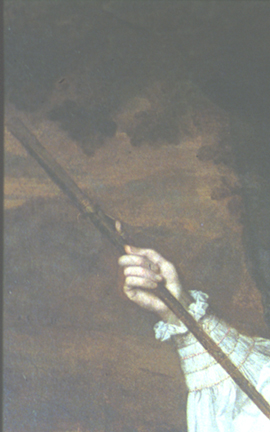
 Attachment: 102.63 KB
Attachment: 102.63 KB
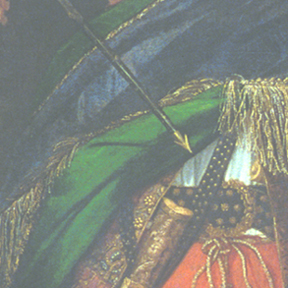
 Attachment: 108.39 KB
Attachment: 108.39 KB
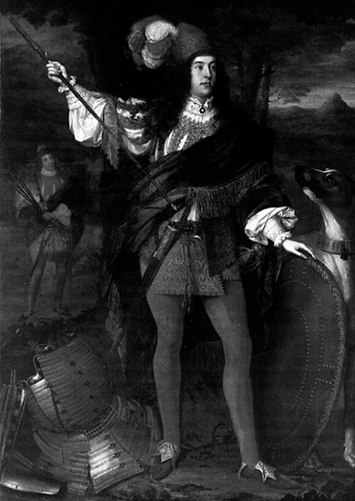
Note the thong, which was a feature of the Irish version.



yeah that's the one.
Both the thong (amentum, either fixed or detachable) or the fletching have the same effect, they both stabilize the weapon (the way the amentum is used it usually confers a spin). This is probably even more important if you are throwing from a height or a very long distance, eventually a javelin will quit flying like a dart and more like a stick.
The use of the amentum also has a very ancient lineage both in Europe and beyond.
http://en.wikipedia.org/wiki/Amentum
EDIT: this bit is particularly interesting: "In the experiments made by General Reffye for the Emperor Napoleon, a javelin that could be thrown only 20 metres by hand could be thrown 80 metres with the amentum."
J
Both the thong (amentum, either fixed or detachable) or the fletching have the same effect, they both stabilize the weapon (the way the amentum is used it usually confers a spin). This is probably even more important if you are throwing from a height or a very long distance, eventually a javelin will quit flying like a dart and more like a stick.
The use of the amentum also has a very ancient lineage both in Europe and beyond.
http://en.wikipedia.org/wiki/Amentum
EDIT: this bit is particularly interesting: "In the experiments made by General Reffye for the Emperor Napoleon, a javelin that could be thrown only 20 metres by hand could be thrown 80 metres with the amentum."
J
ca. 1525
 Attachment: 227.51 KB
Attachment: 227.51 KB
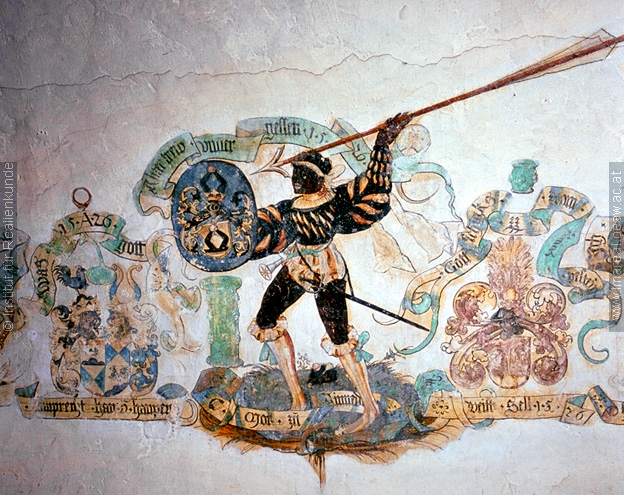

Ok, so who's going to start making these? Obviously we have enough interested customers here... :D
I assembled one of these this weekend in about 15 minutes and got impressive results. I had tried un-fletched darts before without much success, but fletched this one very crudely and the performance knocked me out. When I added a finger loop and got the added leverage and spin, I really couldn't miss--I could put my energy into the throw without concern for the stabilty, etc. The flight was long and high enough to deliver a punch at range. I would estimate 25 yards without the ammentum and 40 with it, and that was holding back just a bit because I was trying to keep the thing out of the brush. I'm amazed how easy it is to throw this thing accurately and over good distance without any experience. Even my 5 year old son could stick it. I just wish I could scale it up to the Continental size. Heads remain elusive in the US.
 Attachment: 152.94 KB
Attachment: 152.94 KB
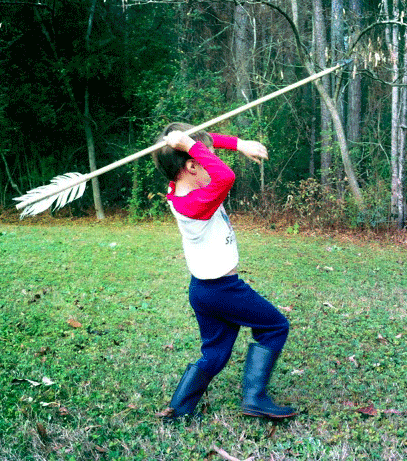

Awesome! That thing looks like a lot of fun.
I'll keep an eye out for appropriate heads as well, as I'd love to try a large one.
I'll keep an eye out for appropriate heads as well, as I'd love to try a large one.
Hello
Your squire, looks like he`s going to be, a dangerous one:-)
Your squire, looks like he`s going to be, a dangerous one:-)
Hello to All!
This is tangential to the topic , but might ,perhaps, be useful.
As someone who has done a a great deal of experimentation with atlatls and the corresponding darts, I can say that good fletching makes a considerable improvement in the stability of atlatl / spear thrower projected darts.The performance of atlatl darts is also greatly influenced by the flexibility of the projectile -a short rigid projectile,(think arrow), can be thrown a great distance,(!00 yards +),with relative ease,but without much accuracy.
An ACCURATE atlatl dart,out to say ,30 or so yards, is six or seven feet long, quite flexible,7-10f pounds flexed longitudinally on a bathroom scale) , and pretty light,I'd say 8 0z. or less( I will weigh my best performing darts and supply data for any who are interested).
This is supposition unsupported by experiment,( At the moment...,this topic has got me thinking about it),but I suspect that some measure of flexibility might be beneficial to the accuracy of a hand thrown dart as well.
AN INTERESTING TOPIC!
Anyone interested in the subject of atlatls or paleolithic technologies in general might benefit from the many excellent utube videos provided under the heading Paleo Aleo.
Scott
This is tangential to the topic , but might ,perhaps, be useful.
As someone who has done a a great deal of experimentation with atlatls and the corresponding darts, I can say that good fletching makes a considerable improvement in the stability of atlatl / spear thrower projected darts.The performance of atlatl darts is also greatly influenced by the flexibility of the projectile -a short rigid projectile,(think arrow), can be thrown a great distance,(!00 yards +),with relative ease,but without much accuracy.
An ACCURATE atlatl dart,out to say ,30 or so yards, is six or seven feet long, quite flexible,7-10f pounds flexed longitudinally on a bathroom scale) , and pretty light,I'd say 8 0z. or less( I will weigh my best performing darts and supply data for any who are interested).
This is supposition unsupported by experiment,( At the moment...,this topic has got me thinking about it),but I suspect that some measure of flexibility might be beneficial to the accuracy of a hand thrown dart as well.
AN INTERESTING TOPIC!
Anyone interested in the subject of atlatls or paleolithic technologies in general might benefit from the many excellent utube videos provided under the heading Paleo Aleo.
Scott
If you have the amentum do you need the fletching too?
J
J
| Jean Henri Chandler wrote: |
| If you have the amentum do you need the fletching too?
J |
In my experience, yes. The loop ads leverage and spin for power and accuracy. The flights keep the thing stable. I just split a single feather and glued/wrapped the resulting halves without regard for their natural curvature, so I don't think they imparted much spin.
Until Tod mentioned the Mary Rose darts I hadn't carefully read that section of Weapons of Warre. That section deals primarily with incendiary naval darts, but it has fantastic detail on those. One of the presumed incendiary "top darts" from the wreck was quite large, and gives us excellent data for a reconstruction of that type, at least. Since these were meant to be thrown from the tops, it's difficult to say how closely they correspond to infantry darts. But note the head, which is a spike set in the end of the dart, with a ferrule to prevent splitting. That's easier to fabricate than the barbed heads. Also note the wood type--this one was not even hardwood. You don't really need good wood for a single-use weapon.
 Attachment: 222.1 KB
Attachment: 222.1 KB
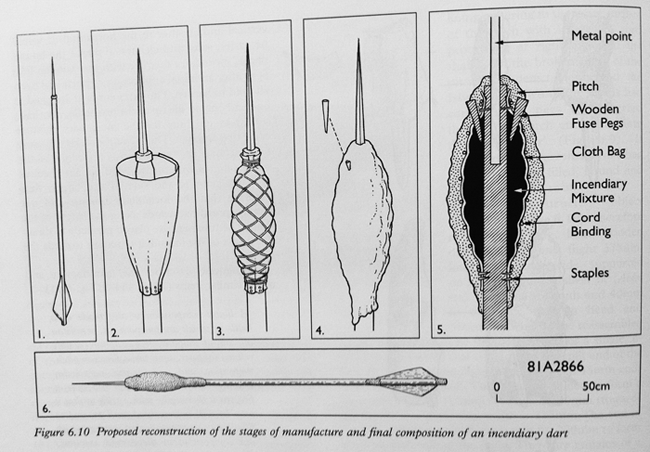
 Attachment: 216.83 KB
Attachment: 216.83 KB
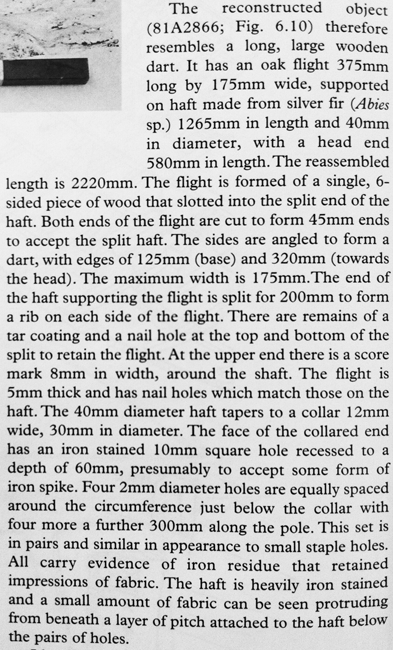


Here are the length conversions for that paragraph, in order of appearance:
375mm=14.75"
175mm=6.8"
1265mm=49.80"
40mm=1.57"
580mm=22.83"
2220mm=87.40" (7.28' overall!)
45mm=1.7"
125mm=4.9"
320mm=12.59
175mm=6.88"
200mm=7.8"
8mm=.31"
5mm=.19"
40mm=1.57"
12mm=.47"
30mm=1.18"
10mm=.39"
60mm= 2.3"
2mm=.078"
300mm=11.81"
375mm=14.75"
175mm=6.8"
1265mm=49.80"
40mm=1.57"
580mm=22.83"
2220mm=87.40" (7.28' overall!)
45mm=1.7"
125mm=4.9"
320mm=12.59
175mm=6.88"
200mm=7.8"
8mm=.31"
5mm=.19"
40mm=1.57"
12mm=.47"
30mm=1.18"
10mm=.39"
60mm= 2.3"
2mm=.078"
300mm=11.81"
that incendiary dart is interesting.
I also seem to vaguely recall that early cannon also shot large arrows too, maybe they shot darts like these too.
I also seem to vaguely recall that early cannon also shot large arrows too, maybe they shot darts like these too.
| William P wrote: |
| that incendiary dart is interesting.
I also seem to vaguely recall that early cannon also shot large arrows too, maybe they shot darts like these too. |
Some of the small Mary Rose darts had flights sized appropriately for gun bores.
Page 2 of 3
You cannot post new topics in this forumYou cannot reply to topics in this forum
You cannot edit your posts in this forum
You cannot delete your posts in this forum
You cannot vote in polls in this forum
You cannot attach files in this forum
You can download files in this forum
All contents © Copyright 2003-2006 myArmoury.com — All rights reserved
Discussion forums powered by phpBB © The phpBB Group
Switch to the Full-featured Version of the forum
Discussion forums powered by phpBB © The phpBB Group
Switch to the Full-featured Version of the forum